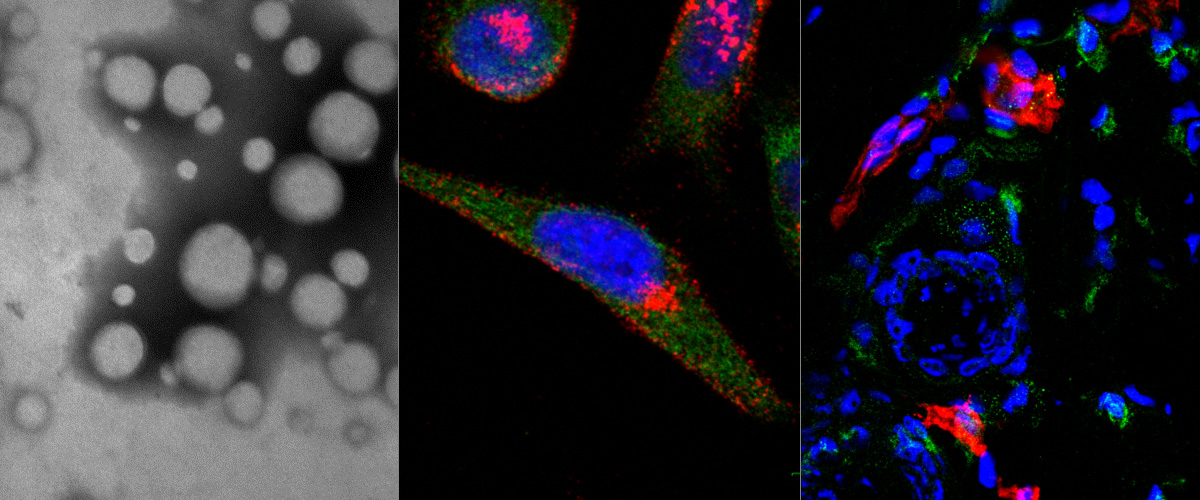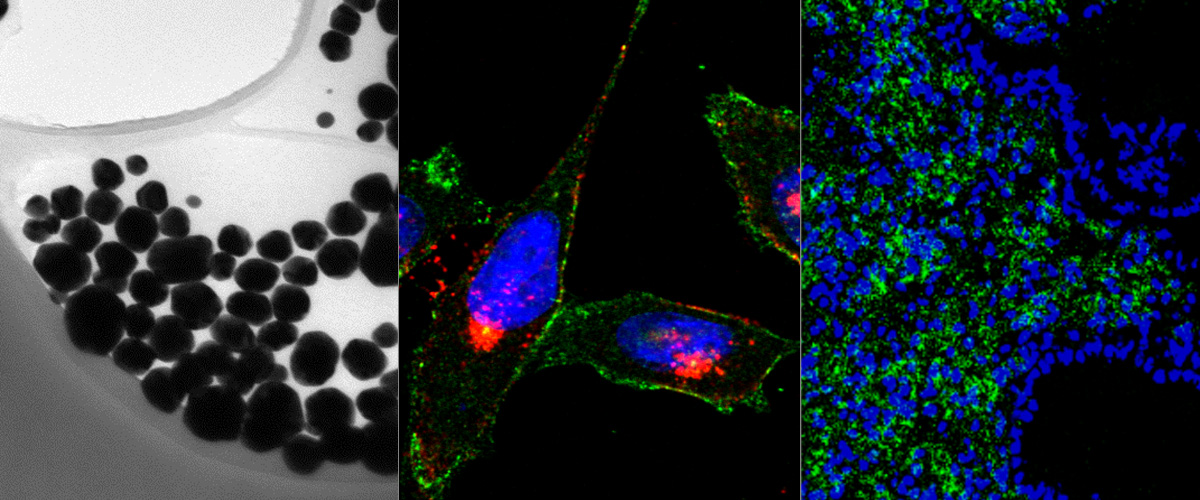New Faces and Exciting Projects: Welcoming Researchers to Our Team in 2023
In the dynamic landscape of 2023, our team has grown stronger with the addition of talented researchers, each bringing unique skills and perspectives to our collaborative efforts.
Antonella Rocchi MSc: Antonella joined us as a visiting PhD student from Prof. Christian Celia’s lab at the University of Chieti G. D’Annunzio / University of L’Aquila, Italy. Her focus lies in the development of peptide-guided nanoparticles for the treatment of the deadly brain tumor, glioblastoma. We are excited to benefit from her expertise and international collaboration.
Jorgen Holm MSc and Jhalak Sethi MSc: These two dynamic individuals have embarked on their PhD journeys with us in fall 2023. Their projects center around the development of homing peptides capable of targeting infiltrative glioma lesions in the brain, serving as nanoparticle guiding ligands. Their dedication promises innovative contributions to our ongoing research.
Rasmus Enno BSc: Rasmus, our MSc student, has delved into the fall semester with a focus on the expression of recombinant receptors for homing peptides. His work also involves the development of novel methodologies for the identification of homing peptide receptors, showcasing a commitment to advancing our understanding in this field.
Kristina Rabi: As a BSc student, Kristina has joined our laboratory with a dual role. Beyond her research efforts aimed at improving in vivo playoff technology, she actively supports our team as a lab assistant, bringing valuable contributions to our phage display-related activities.
As we welcome these talented individuals, we look forward to the diverse perspectives and collaborative spirit they bring to our team. Together, we aim to make significant strides in the fascinating realms of nanomedicine and precision targeting.
Nanomedicine Discussions and Collaborative Visit in Colorado
From May 4 to 6, 2023, Professor Teesalu participated in the "Mechanisms and Barriers in Nanomedicine" conference in Golden, Colorado. The conference, organized by fellow Ruoslahti lab alumnus Professor Dmitri Simberg, provided a platform for Prof. Teesalu to share insights through an oral presentation. For more information, you can visit the conference website: Conference Link.
After the conference, Prof. Teesalu visited Professor Gregory Robertson's lab at Colorado State University (Robertson Lab). During the visit, he gave a seminar and engaged in discussions about collaborative work, particularly on targeting mycobacterial infections. This research is funded by the Gates Foundation.
Farewell to Assintant Professor Lorena Simón Gracia: A Decade of Dedication and a New Chapter
After more than a decade of invaluable contributions, Lorena has made the decision to embark on a new chapter in her career back in her native Spain. As she transitions into this exciting phase, we extend our heartfelt wishes for success both within and outside the laboratory.
Although Lorena is leaving our day-to-day team, she will remain connected to the Laboratory of Precision and Nanomedicine as a visiting researcher. This continuity in collaboration reflects the enduring bonds forged over the years and the ongoing exchange of knowledge and ideas.
To commemorate Lorena's time with us, we organized a special canoeing day trip on the picturesque Ahja river. As Lorena sets sail for new horizons, we express our deepest gratitude for her dedication and hard work. We look forward to the continued collaboration in her new role and wish her the very best in all her future endeavors, both personally and professionally. ¡Buena suerte, Lorena!
Congratulations to Anni Lepland and Kristina Kiisholts for defending their PhD theses!
We extend our heartfelt congratulations to Anni Lepland and Kristina Kiisholts for their successful defense of their PhD theses, showcasing significant contributions to the field of precision nanomedicine.
Kristina Kiisholts defended her thesis, titled "Peptide-based drug carriers and preclinical nanomedicine applications for endometriosis treatment," on April 28, 2023. This collaborative and interdisciplinary study, cosupervised by Professors Kaido Kurrikoff, Andres Salumets, Tambet Teesalu, and Ülo Langel, explored peptide-based nanomedical applications for endometriosis treatment. The opponent for the defense was Professor Pirjo Laakkonen from the University of Helsinki (Finland). The findings from Kiisholts' thesis propose promising peptide-based approaches for endometriosis treatment with potential translational relevance. Link to more details and Link to Thesis.
Anni Lepland's thesis, "Precision targeting of tumor-associated macrophages in triple negative breast cancer," focused on peptide-guided targeting of tumor macrophages in breast cancer. Supervised by Professors Pablo D Scodeller and Tambet Teesalu, the thesis defense took place with Assistant Professor Maija Hollmén from the University of Turku (Finland) as the opponent. Notably, Lepland's thesis was honored with the Best Doctoral Thesis Award for 2023 in Biomedicine in December 2023. Link to Thesis and More details on the award.
We wish both Anni Lepland and Kristina Kiisholts continued success in their future careers, confident that their research will leave a lasting impact on the field of nanomedicine.
Homing peptides for targeted delivery of compounds across the blood-brain barrier (01.01.2018–31.12.2022)
Abstract: Our laboratory uses in vivo phage display to find homing peptides for systemic targeting of diagnostic and therapeutic payloads, primarily in the context of malignant disease. In our quest to target infiltrative glioblastoma (GBM) guerilla cells, which hide in the brain parenchyma behind highly impermeable blood-brain barrier (BBB), we became interested in exploration of the novel ways of delivering compounds to specific cell types in the brain. The goal of the current proposal is to develop peptide affinity ligands for targeting compounds (such as molecular and nanoscale sensors, actuators, and therapeutics) across the BBB to specific cells (including malignant cells) in the brain parenchyma. Improved affinity ligands crossing of the BBB would have broad applications beyond neuro-oncology, and allow non-invasive monitoring and/or activity modulation of specific cells and synapses in the mammalian brain e.g. in the context of neurodegenerative and neuro-inflammatory diseases.
Development of extracellular matrix-targeting precision cancer therapy (01.01.2020–30.06.2021)
Abstract: With the support of the EAG79 grant we performed comprehensive studies on preclinical development of the homing peptide that interacts with the extracellular matrix in solid tumors (proprietary PL1 peptide). Our results show that the bifunctional PL1 peptide, a platform technology for the development of tumour-specific molecular imaging and therapeutic conjugates, is superior to existing and emerging tumour-targeting payload-delivery strategies. With the support of the grant EAG79, we developed the system based on pprecision tumor delivery of drugs and companion imaging agents, and submitted the patent application to protect IP of the PL1 and related peptides in 2020 (International PCT No: PCT/IB2020/050847; Application Number: 62800879). The studies carried out with the support of the EAG79 grant form a backbone of the follow up European Innovation Council grant application (EIC transition grant, 2,5MEUR) on preclinical and clinical development of PL1 peptide that was submitted on September 22, 2021. This proposal will support establishment of a spin-off company of the University of Tartu (Precision Peptide Therapeutics) and international collaborative effort on translational development of PL1 guided drugs and contrast agents.
Precision targeting of infiltrative glioblastoma (01.01.2023–31.12.2027)
Abstract: Glioblastoma is the most aggressive form of primary brain cancer with no effective cure. In preclinical studies, homing peptide targeting ligands have proven useful in increasing accumulation of anticancer drugs in glioblastoma core lesions. However, new therapeutic paradigms are needed as the current peptides fail to target infiltrative “guerilla” malignant cells located away from tumor core behind the blood brain barrier. This project proposes interdisciplinary and translationally-oriented studies on identification and preclinical validation of homing peptides able to penetrate the blood brain barrier and to target infiltrative glioblastoma cells. The project will lead to identification and mechanistic characterization of the infiltrative glioblastoma targeting peptides and execution of the preclinical studies with peptide-guided therapeutic nanoparticles and radiotracers. These studies may lead to a new paradigm of peptide-based precision management of infiltrative glioblastoma.
Paclitaxel-Loaded Cationic Fluid Lipid Nanodiscs and Liposomes with Brush-Conformation PEG Chains Penetrate Breast Tumors and Trigger Caspase-3 Activation.
SARS-CoV-2 infects adipose tissue in a fat depot- and viral lineage-dependent manner.
ESCPE-1 mediates retrograde endosomal sorting of the SARS-CoV-2 host factor Neuropilin-1.
Preclinical Validation of Tumor-Penetrating and Interfering Peptides against Chronic Lymphocytic Leukemia.
PL1 Peptide Engages Acidic Surfaces on Tumor-Associated Fibronectin and Tenascin Isoforms to Trigger Cellular Uptake.
Pharmaceutics. 2021 Nov 24;13(12):1998. doi: 10.3390/pharmaceutics13121998.



